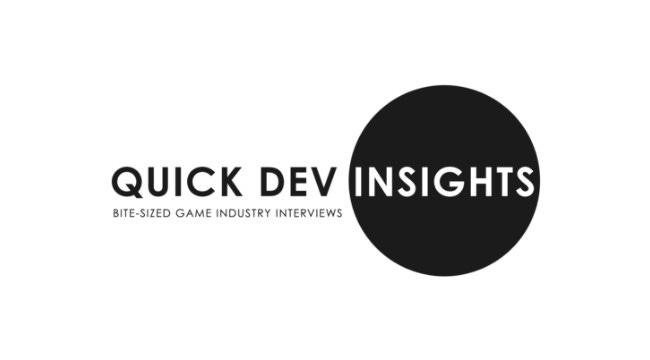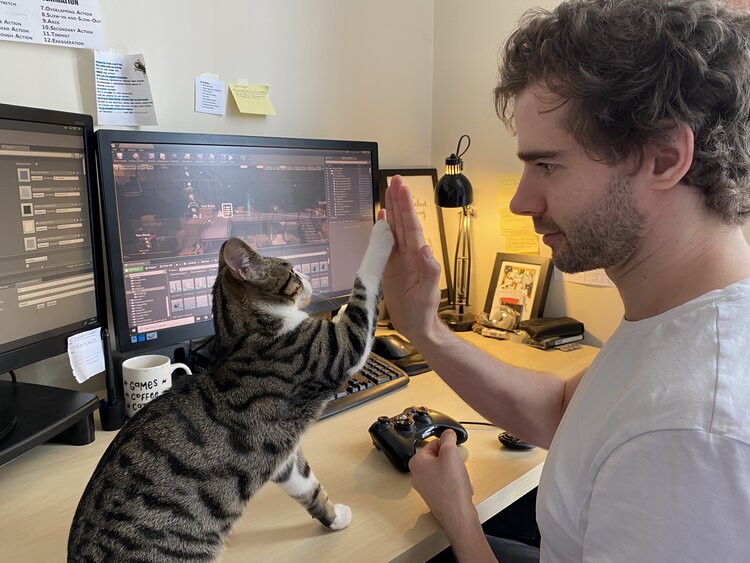Trending
Opinion: How will Project 2025 impact game developers?
The Heritage Foundation's manifesto for the possible next administration could do great harm to many, including large portions of the game development community.

Featured Blog | This community-written post highlights the best of what the game industry has to offer. Read more like it on the Game Developer Blogs or learn how to Submit Your Own Blog Post
This is the first in a series of bite-sized interviews with people who work in and around the games industry, from indie to AAA.

Welcome to Quick Dev Insights. A series of bite-sized interviews with people who work in and around the games industry, from indie to AAA. A full list of these interviews can be found here and you can follow my Twitter to find out when new ones are released!
As this is the first in the series, I thought I would use myself as a guinea pig before I ask other games industry people to get involved! So here we go:

I'm James Rowbotham and I go by CB game Dev (Colourblind game developer). I've been making games for close to a decade now, which makes me feel old when I actually write it down, ha. I make bigger games with my friends in an indie games company that we built from the ground up and smaller-scale games on my own in my spare time. Because I work in a small team/solo I get to work in a lot of different areas in my day-to-day, but generally in our team, I focus on: Animation, UI, Sound, and blueprints (Unreal Engine).
I think problem-solving has become one of my most important/useful skills. If I was to delve a little deeper into this, I would say it is about finding the right problem to solve even more so than being capable of finding good solutions. This can be more obviously relevant in the technical roles like coding, etc. but it’s also applicable across the board from game design to art to the more abstract like "game feel". An example of this that I have experienced is working on a game mechanic/system which doesn't feel right. You fix problems, add more parts to it, add more "juice" and continually rebalance it, but although now less clunky something is still off. I like to think of this like putting plasters on a mechanic when instead, if we take a step back maybe the whole system should be removed as it is irrelevant or doesn’t feel cohesive with the rest of the game as a whole. By going too micro we can miss the "bigger problem" to solve.
If you are going to be an indie game dev, you are going to need to wear a lot of hats which means you’re going to need to learn a lot of different things in different areas. Learning itself is a skill that we can get better at. Find what works for you. Personally, when trying to learn something new I have found that jumping in the deep end and setting my own goals are great ways to help accelerate your understanding and give a better grasp of how things work. For me, a good example of this is when I wanted to learn some Unreal C++. I started doing a (good) UE4 C++ course but didn’t feel like I was really understanding, more just following along. In the end, I decided to just start my own Unreal Engine project from a C++ base and work through problems as I went along. I found that by having my own smaller self-directed goals and problems to solve I was more engaged and actually understood why things were happening. This won’t be for everyone but I think there is definitely merit to the idea, even if you apply it in different ways. For example, when doing a course, follow along with the teacher but then try to expand the ideas you are learning outside the bounds of the course while doing it.
I'd love to say it doesn’t but it definitely does. It makes anything on the art side (that involves colours) a lot harder and I can make "mistakes" without even knowing it. A funny example of this happened once when we had a publisher come visit us to see the progress we had been making. I had been working on some "crafting stations" in a survival game, one of which was a campfire, and long story short, I had made the fire green, my bad, ha (I get yellow and green mixed up). However, I would say that if you are colourblind and want to get into the games industry or switch roles, there are still loads of jobs that you don't really need to rely on colour: animation, sound, coding, QA, producing, etc. There are also generally ways around things: for example, if you are making a solo game and struggle with colours, pick an art style that you can work with and get others to sanity-check your stuff every so often.
Google would have to be the number one, I literally use it every day to solve problems, find references, etc. Outside of that, there are a couple of books that are definitely worth a read and that have changed the way I think and approach things:
Deep Work (Cal Newport) - Summed up in a line: Quantity of time put in doesn’t always equal more results and quality of focus can help you get more done.
Make Time (Jake Knapp, John Zeratsky) - Summed up in a line: Move things around to create more time for the things in your day you care about through prioritising. In other words try to make time for the things that matter to you / could have potential, instead of just always putting out fires or doing the things you have to (I started my Quick Dev Tips and this Quick Dev Insights series based on this concept).
Freerunners: A solo project I’m developing where you play as a Freerunner and do parkour. Give the game a wishlist if you like the look of it!
Quick Dev Tips: A series of fast bite-sized game development tips and tricks, predominantly focused around Unreal Engine 4 / 5
Quick Dev Insights: A series of bite-sized interviews with people who work in and around the games industry, from indie to AAA
Read more about:
Featured BlogsYou May Also Like